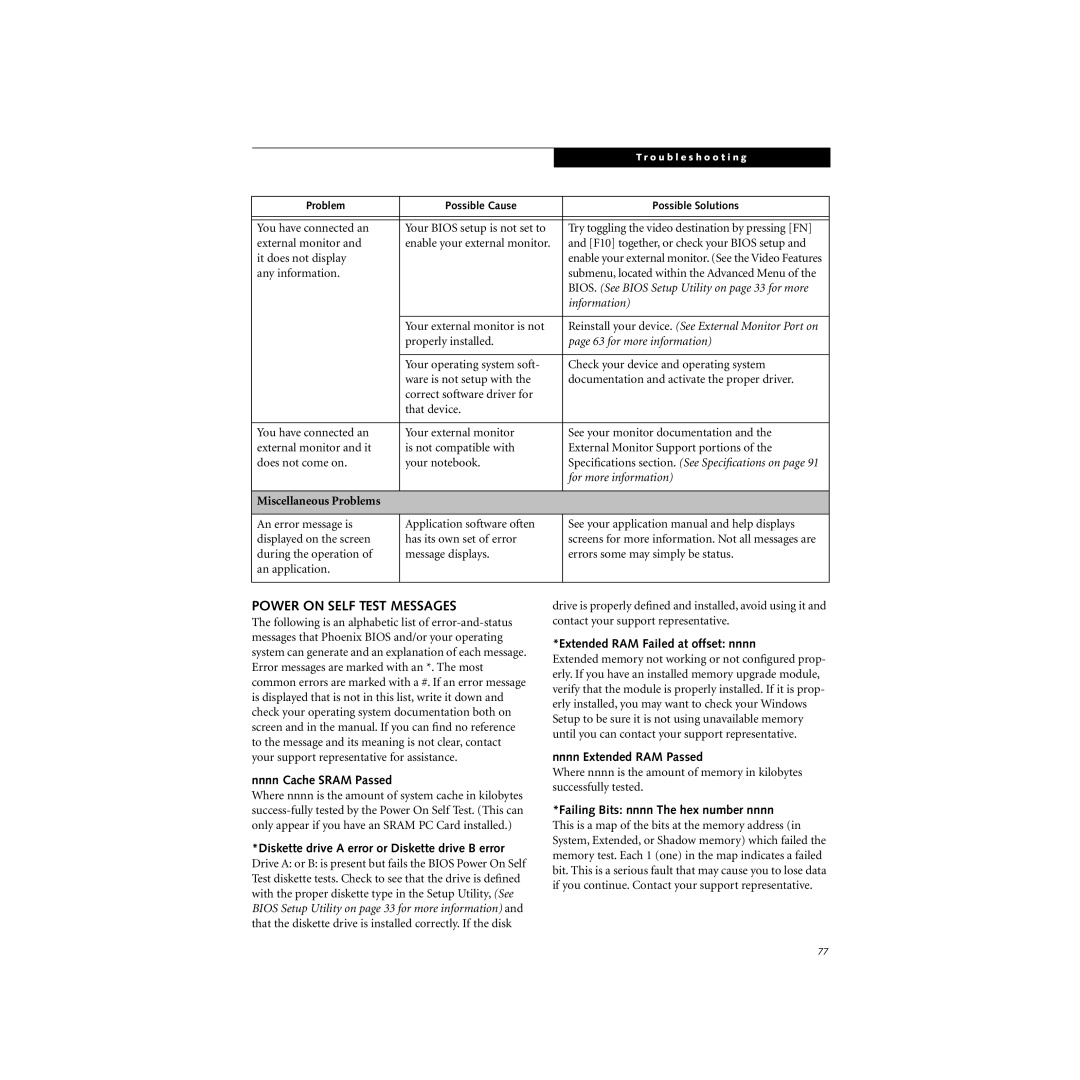|
|
| T r o u b l e s h o o t i n g |
|
|
|
|
|
|
|
|
Problem | Possible Cause |
| Possible Solutions |
|
|
|
|
|
|
|
|
You have connected an | Your BIOS setup is not set to |
| Try toggling the video destination by pressing [FN] |
external monitor and | enable your external monitor. |
| and [F10] together, or check your BIOS setup and |
it does not display |
|
| enable your external monitor. (See the Video Features |
any information. |
|
| submenu, located within the Advanced Menu of the |
|
|
| BIOS. (See BIOS Setup Utility on page 33 for more |
|
|
| information) |
|
|
|
|
| Your external monitor is not |
| Reinstall your device. (See External Monitor Port on |
| properly installed. |
| page 63 for more information) |
|
|
|
|
| Your operating system soft- |
| Check your device and operating system |
| ware is not setup with the |
| documentation and activate the proper driver. |
| correct software driver for |
|
|
| that device. |
|
|
|
|
|
|
You have connected an | Your external monitor |
| See your monitor documentation and the |
external monitor and it | is not compatible with |
| External Monitor Support portions of the |
does not come on. | your notebook. |
| Specifications section. (See Specifications on page 91 |
|
|
| for more information) |
|
|
|
|
Miscellaneous Problems |
|
|
|
|
|
|
|
An error message is | Application software often |
| See your application manual and help displays |
displayed on the screen | has its own set of error |
| screens for more information. Not all messages are |
during the operation of | message displays. |
| errors some may simply be status. |
an application. |
|
|
|
|
|
|
|
POWER ON SELF TEST MESSAGES
The following is an alphabetic list of
nnnn Cache SRAM Passed
Where nnnn is the amount of system cache in kilobytes
*Diskette drive A error or Diskette drive B error
Drive A: or B: is present but fails the BIOS Power On Self Test diskette tests. Check to see that the drive is defined with the proper diskette type in the Setup Utility, (See BIOS Setup Utility on page 33 for more information) and that the diskette drive is installed correctly. If the disk
drive is properly defined and installed, avoid using it and contact your support representative.
*Extended RAM Failed at offset: nnnn
Extended memory not working or not configured prop- erly. If you have an installed memory upgrade module, verify that the module is properly installed. If it is prop- erly installed, you may want to check your Windows Setup to be sure it is not using unavailable memory until you can contact your support representative.
nnnn Extended RAM Passed
Where nnnn is the amount of memory in kilobytes successfully tested.
*Failing Bits: nnnn The hex number nnnn
This is a map of the bits at the memory address (in System, Extended, or Shadow memory) which failed the memory test. Each 1 (one) in the map indicates a failed bit. This is a serious fault that may cause you to lose data if you continue. Contact your support representative.
77
